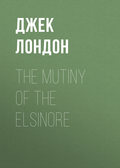
Джек Лондон
Мартин Иден / Martin Eden
One afternoon a week she gave to him, and arriving late, he usually stayed for dinner and for music afterward. Those were his red-letter days. The atmosphere of the house, in such contrast with that in which he lived, and the mere nearness to her, sent him forth each time with a firmer grip on his resolve to climb the heights. In spite of the beauty in him, and the aching desire to create, it was for her that he struggled. He was a lover first and always. All other things he subordinated to love.
Greater than his adventure in the world of thought was his love-adventure. The world itself was not so amazing because of the atoms and molecules that composed it according to the propulsions of irresistible force; what made it amazing was the fact that Ruth lived in it. She was the most amazing thing he had ever known, or dreamed, or guessed.
But he was oppressed always by her remoteness. She was so far from him, and he did not know how to approach her. He had been a success with girls and women in his own class; but he had never loved any of them, while he did love her, and besides, she was not merely of another class. His very love elevated her above all classes. She was a being apart, so far apart that he did not know how to draw near to her as a lover should draw near. It was true, as he acquired knowledge and language, that he was drawing nearer, talking her speech, discovering ideas and delights in common; but this did not satisfy his lover’s yearning. His lover’s imagination had made her holy, too holy, too spiritualized, to have any kinship with him in the flesh. It was his own love that thrust her from him and made her seem impossible for him. Love itself denied him the one thing that it desired.
And then, one day, without warning, the gulf between them was bridged for a moment, and thereafter, though the gulf remained, it was ever narrower. They had been eating cherries-great, luscious, black cherries with a juice of the color of dark wine. And later, as she read aloud to him from “The Princess,” he chanced to notice the stain of the cherries on her lips. For the moment her divinity was shattered. She was clay, after all, mere clay, subject to the common law of clay as his clay was subject, or anybody’s clay. Her lips were flesh like his, and cherries dyed them as cherries dyed his. And if so with her lips, then was it so with all of her. She was woman, all woman, just like any woman. It came upon him abruptly. It was a revelation that stunned him. It was as if he had seen the sun fall out of the sky, or had seen worshipped purity polluted.
Then he realized the significance of it, and his heart began pounding and challenging him to play the lover with this woman who was not a spirit from other worlds but a mere woman with lips a cherry could stain. He trembled at the audacity of his thought; but all his soul was singing, and reason, in a triumphant paean, assured him he was right. Something of this change in him must have reached her, for she paused from her reading, looked up at him, and smiled. His eyes dropped from her blue eyes to her lips, and the sight of the stain maddened him. His arms all but flashed out to her and around her, in the way of his old careless life. She seemed to lean toward him, to wait, and all his will fought to hold him back.
“You were not following a word,” she pouted.
Then she laughed at him, delighting in his confusion, and as he looked into her frank eyes and knew that she had divined nothing of what he felt, he became abashed. He had indeed in thought dared too far. Of all the women he had known there was no woman who would not have guessed-save her. And she had not guessed. There was the difference. She was different. He was appalled by his own grossness, awed by her clear innocence, and he gazed again at her across the gulf. The bridge had broken down.
But still the incident had brought him nearer. The memory of it persisted, and in the moments when he was most cast down, he dwelt upon it eagerly. The gulf was never again so wide. He had accomplished a distance vastly greater than a bachelorship of arts, or a dozen bachelorships. She was pure, it was true, as he had never dreamed of purity; but cherries stained her lips. She was subject to the laws of the universe just as inexorably as he was. She had to eat to live, and when she got her feet wet, she caught cold. But that was not the point. If she could feel hunger and thirst, and heat and cold, then could she feel love-and love for a man. Well, he was a man. And why could he not be the man? “It’s up to me to make good,” he would murmur fervently. “I will be the man. I will make myself the man. I will make good.”
Chapter XII
Early one evening, struggling with a sonnet that twisted all awry the beauty and thought that trailed in glow and vapor through his brain, Martin was called to the telephone.
“It’s a lady’s voice, a fine lady’s,” Mr. Higginbotham, who had called him, jeered.
Martin went to the telephone in the corner of the room, and felt a wave of warmth rush through him as he heard Ruth’s voice. In his battle with the sonnet he had forgotten her existence, and at the sound of her voice his love for her smote him like a sudden blow. And such a voice!-delicate and sweet, like a strain of music heard far off and faint, or, better, like a bell of silver, a perfect tone, crystal-pure. No mere woman had a voice like that. There was something celestial about it, and it came from other worlds. He could scarcely hear what it said, so ravished was he, though he controlled his face, for he knew that Mr. Higginbotham’s ferret eyes were fixed upon him.
It was not much that Ruth wanted to say-merely that Norman had been going to take her to a lecture that night, but that he had a headache, and she was so disappointed, and she had the tickets, and that if he had no other engagement, would he be good enough to take her?
Would he! He fought to suppress the eagerness in his voice. It was amazing. He had always seen her in her own house. And he had never dared to ask her to go anywhere with him. Quite irrelevantly, still at the telephone and talking with her, he felt an overpowering desire to die for her, and visions of heroic sacrifice shaped and dissolved in his whirling brain. He loved her so much, so terribly, so hopelessly. In that moment of mad happiness that she should go out with him, go to a lecture with him-with him, Martin Eden-she soared so far above him that there seemed nothing else for him to do than die for her. It was the only fit way in which he could express the tremendous and lofty emotion he felt for her. It was the sublime abnegation of true love that comes to all lovers, and it came to him there, at the telephone, in a whirlwind of fire and glory; and to die for her, he felt, was to have lived and loved well. And he was only twenty-one, and he had never been in love before.
His hand trembled as he hung up the receiver, and he was weak from the organ which had stirred him. His eyes were shining like an angel’s, and his face was transfigured, purged of all earthly dross, and pure and holy.
“Makin’ dates outside, eh?” his brother-in-law sneered. “You know what that means. You’ll be in the police court yet.”
But Martin could not come down from the height. Not even the bestiality of the allusion could bring him back to earth. Anger and hurt were beneath him. He had seen a great vision and was as a god, and he could feel only profound and awful pity for this maggot of a man. He did not look at him, and though his eyes passed over him, he did not see him; and as in a dream he passed out of the room to dress. It was not until he had reached his own room and was tying his necktie that he became aware of a sound that lingered unpleasantly in his ears. On investigating this sound he identified it as the final snort of Bernard Higginbotham, which somehow had not penetrated to his brain before.
As Ruth’s front door closed behind them and he came down the steps with her, he found himself greatly perturbed. It was not unalloyed bliss, taking her to the lecture. He did not know what he ought to do. He had seen, on the streets, with persons of her class, that the women took the men’s arms. But then, again, he had seen them when they didn’t; and he wondered if it was only in the evening that arms were taken, or only between husbands and wives and relatives.
Just before he reached the sidewalk, he remembered Minnie. Minnie had always been a stickler. She had called him down the second time she walked out with him, because he had gone along on the inside, and she had laid the law down to him that a gentleman always walked on the outside-when he was with a lady. And Minnie had made a practice of kicking his heels, whenever they crossed from one side of the street to the other, to remind him to get over on the outside. He wondered where she had got that item of etiquette, and whether it had filtered down from above and was all right.
It wouldn’t do any harm to try it, he decided, by the time they had reached the sidewalk; and he swung behind Ruth and took up his station on the outside. Then the other problem presented itself. Should he offer her his arm? He had never offered anybody his arm in his life. The girls he had known never took the fellows’ arms. For the first several times they walked freely, side by side, and after that it was arms around the waists, and heads against the fellows’ shoulders where the streets were unlighted. But this was different. She wasn’t that kind of a girl. He must do something.
He crooked the arm next to her-crooked it very slightly and with secret tentativeness, not invitingly, but just casually, as though he was accustomed to walk that way. And then the wonderful thing happened. He felt her hand upon his arm. Delicious thrills ran through him at the contact, and for a few sweet moments it seemed that he had left the solid earth and was flying with her through the air. But he was soon back again, perturbed by a new complication. They were crossing the street. This would put him on the inside. He should be on the outside. Should he therefore drop her arm and change over? And if he did so, would he have to repeat the manoeuvre the next time? And the next? There was something wrong about it, and he resolved not to caper about and play the fool. Yet he was not satisfied with his conclusion, and when he found himself on the inside, he talked quickly and earnestly, making a show of being carried away by what he was saying, so that, in case he was wrong in not changing sides, his enthusiasm would seem the cause for his carelessness.
As they crossed Broadway, he came face to face with a new problem. In the blaze of the electric lights, he saw Lizzie Connolly and her giggly friend. Only for an instant he hesitated, then his hand went up and his hat came off. He could not be disloyal to his kind, and it was to more than Lizzie Connolly that his hat was lifted. She nodded and looked at him boldly, not with soft and gentle eyes like Ruth’s, but with eyes that were handsome and hard, and that swept on past him to Ruth and itemized her face and dress and station. And he was aware that Ruth looked, too, with quick eyes that were timid and mild as a dove’s, but which saw, in a look that was a flutter on and past, the working-class girl in her cheap finery and under the strange hat that all working-class girls were wearing just then.
“What a pretty girl!” Ruth said a moment later.
Martin could have blessed her, though he said:
“I don’t know. I guess it’s all a matter of personal taste, but she doesn’t strike me as being particularly pretty.”
“Why, there isn’t one woman in ten thousand with features as regular as hers. They are splendid. Her face is as clear-cut as a cameo. And her eyes are beautiful.”
“Do you think so?” Martin queried absently, for to him there was only one beautiful woman in the world, and she was beside him, her hand upon his arm.
“Do I think so? If that girl had proper opportunity to dress, Mr. Eden, and if she were taught how to carry herself, you would be fairly dazzled by her, and so would all men.”
“She would have to be taught how to speak,” he commented, “or else most of the men wouldn’t understand her. I’m sure you couldn’t understand a quarter of what she said if she just spoke naturally.”
“Nonsense! You are as bad as Arthur when you try to make your point.”
“You forget how I talked when you first met me. I have learned a new language since then. Before that time I talked as that girl talks. Now I can manage to make myself understood sufficiently in your language to explain that you do not know that other girl’s language. And do you know why she carries herself the way she does? I think about such things now, though I never used to think about them, and I am beginning to understand-much.”
“But why does she?”
“She has worked long hours for years at machines. When one’s body is young, it is very pliable, and hard work will mould it like putty according to the nature of the work. I can tell at a glance the trades of many workingmen I meet on the street. Look at me. Why am I rolling all about the shop? Because of the years I put in on the sea. If I’d put in the same years cow-punching, with my body young and pliable, I wouldn’t be rolling now, but I’d be bow-legged. And so with that girl. You noticed that her eyes were what I might call hard. She has never been sheltered. She has had to take care of herself, and a young girl can’t take care of herself and keep her eyes soft and gentle like-like yours, for example.”
“I think you are right,” Ruth said in a low voice. “And it is too bad. She is such a pretty girl.”
He looked at her and saw her eyes luminous with pity. And then he remembered that he loved her and was lost in amazement at his fortune that permitted him to love her and to take her on his arm to a lecture.
Who are you, Martin Eden? he demanded of himself in the looking-glass, that night when he got back to his room. He gazed at himself long and curiously. Who are you? What are you? Where do you belong? You belong by rights to girls like Lizzie Connolly. You belong with the legions of toil, with all that is low, and vulgar, and unbeautiful. You belong with the oxen and the drudges, in dirty surroundings among smells and stenches. There are the stale vegetables now. Those potatoes are rotting. Smell them, damn you, smell them. And yet you dare to open the books, to listen to beautiful music, to learn to love beautiful paintings, to speak good English, to think thoughts that none of your own kind thinks, to tear yourself away from the oxen and the Lizzie Connollys and to love a pale spirit of a woman who is a million miles beyond you and who lives in the stars! Who are you? and what are you? damn you! And are you going to make good?
He shook his fist at himself in the glass, and sat down on the edge of the bed to dream for a space with wide eyes. Then he got out note-book and algebra and lost himself in quadratic equations, while the hours slipped by, and the stars dimmed, and the gray of dawn flooded against his window.
Chapter XIII
It was the knot of wordy socialists and working-class philosophers that held forth in the City Hall Park on warm afternoons that was responsible for the great discovery. Once or twice in the month, while riding through the park on his way to the library, Martin dismounted from his wheel and listened to the arguments, and each time he tore himself away reluctantly. The tone of discussion was much lower than at Mr. Morse’s table. The men were not grave and dignified. They lost their tempers easily and called one another names, while oaths and obscene allusions were frequent on their lips. Once or twice he had seen them come to blows. And yet, he knew not why, there seemed something vital about the stuff of these men’s thoughts. Their logomachy was far more stimulating to his intellect than the reserved and quiet dogmatism of Mr. Morse. These men, who slaughtered English, gesticulated like lunatics, and fought one another’s ideas with primitive anger, seemed somehow to be more alive than Mr. Morse and his crony, Mr. Butler.
Martin had heard Herbert Spencer quoted several times in the park, but one afternoon a disciple of Spencer’s appeared, a seedy tramp with a dirty coat buttoned tightly at the throat to conceal the absence of a shirt. Battle royal was waged, amid the smoking of many cigarettes and the expectoration of much tobacco-juice, wherein the tramp successfully held his own, even when a socialist workman sneered, “There is no god but the Unknowable, and Herbert Spencer is his prophet.” Martin was puzzled as to what the discussion was about, but when he rode on to the library he carried with him a new-born interest in Herbert Spencer, and because of the frequency with which the tramp had mentioned “First Principles,” Martin drew out that volume.
So the great discovery began. Once before he had tried Spencer, and choosing the “Principles of Psychology” to begin with, he had failed as abjectly as he had failed with Madam Blavatsky. There had been no understanding the book, and he had returned it unread. But this night, after algebra and physics, and an attempt at a sonnet, he got into bed and opened “First Principles.” Morning found him still reading. It was impossible for him to sleep. Nor did he write that day. He lay on the bed till his body grew tired, when he tried the hard floor, reading on his back, the book held in the air above him, or changing from side to side. He slept that night, and did his writing next morning, and then the book tempted him and he fell, reading all afternoon, oblivious to everything and oblivious to the fact that that was the afternoon Ruth gave to him. His first consciousness of the immediate world about him was when Bernard Higginbotham jerked open the door and demanded to know if he thought they were running a restaurant.
Martin Eden had been mastered by curiosity all his days. He wanted to know, and it was this desire that had sent him adventuring over the world. But he was now learning from Spencer that he never had known, and that he never could have known had he continued his sailing and wandering forever. He had merely skimmed over the surface of things, observing detached phenomena, accumulating fragments of facts, making superficial little generalizations-and all and everything quite unrelated in a capricious and disorderly world of whim and chance. The mechanism of the flight of birds he had watched and reasoned about with understanding; but it had never entered his head to try to explain the process whereby birds, as organic flying mechanisms, had been developed. He had never dreamed there was such a process. That birds should have come to be, was unguessed. They always had been. They just happened.
And as it was with birds, so had it been with everything. His ignorant and unprepared attempts at philosophy had been fruitless. The medieval metaphysics of Kant had given him the key to nothing, and had served the sole purpose of making him doubt his own intellectual powers. In similar manner his attempt to study evolution had been confined to a hopelessly technical volume by Romanes. He had understood nothing, and the only idea he had gathered was that evolution was a dry-as-dust theory, of a lot of little men possessed of huge and unintelligible vocabularies. And now he learned that evolution was no mere theory but an accepted process of development; that scientists no longer disagreed about it, their only differences being over the method of evolution.
And here was the man Spencer, organizing all knowledge for him, reducing everything to unity, elaborating ultimate realities, and presenting to his startled gaze a universe so concrete of realization that it was like the model of a ship such as sailors make and put into glass bottles. There was no caprice, no chance. All was law. It was in obedience to law that the bird flew, and it was in obedience to the same law that fermenting slime had writhed and squirmed and put out legs and wings and become a bird.
Martin had ascended from pitch to pitch of intellectual living, and here he was at a higher pitch than ever. All the hidden things were laying their secrets bare. He was drunken with comprehension. At night, asleep, he lived with the gods in colossal nightmare; and awake, in the day, he went around like a somnambulist, with absent stare, gazing upon the world he had just discovered. At table he failed to hear the conversation about petty and ignoble things, his eager mind seeking out and following cause and effect in everything before him. In the meat on the platter he saw the shining sun and traced its energy back through all its transformations to its source a hundred million miles away, or traced its energy ahead to the moving muscles in his arms that enabled him to cut the meat, and to the brain wherewith he willed the muscles to move to cut the meat, until, with inward gaze, he saw the same sun shining in his brain. He was entranced by illumination, and did not hear the “Bughouse,” whispered by Jim, nor see the anxiety on his sister’s face, nor notice the rotary motion of Bernard Higginbotham’s finger, whereby he imparted the suggestion of wheels revolving in his brother-in-law’s head.
What, in a way, most profoundly impressed Martin, was the correlation of knowledge-of all knowledge. He had been curious to know things, and whatever he acquired he had filed away in separate memory compartments in his brain. Thus, on the subject of sailing he had an immense store. On the subject of woman he had a fairly large store. But these two subjects had been unrelated. Between the two memory compartments there had been no connection. That, in the fabric of knowledge, there should be any connection whatever between a woman with hysterics and a schooner carrying a weather-helm or heaving to in a gale, would have struck him as ridiculous and impossible. But Herbert Spencer had shown him not only that it was not ridiculous, but that it was impossible for there to be no connection. All things were related to all other things from the farthermost star in the wastes of space to the myriads of atoms in the grain of sand under one’s foot. This new concept was a perpetual amazement to Martin, and he found himself engaged continually in tracing the relationship between all things under the sun and on the other side of the sun. He drew up lists of the most incongruous things and was unhappy until he succeeded in establishing kinship between them all-kinship between love, poetry, earthquake, fire, rattlesnakes, rainbows, precious gems, monstrosities, sunsets, the roaring of lions, illuminating gas, cannibalism, beauty, murder, lovers, fulcrums, and tobacco. Thus, he unified the universe and held it up and looked at it, or wandered through its byways and alleys and jungles, not as a terrified traveller in the thick of mysteries seeking an unknown goal, but observing and charting and becoming familiar with all there was to know. And the more he knew, the more passionately he admired the universe, and life, and his own life in the midst of it all.
“You fool!” he cried at his image in the looking-glass. “You wanted to write, and you tried to write, and you had nothing in you to write about. What did you have in you?-some childish notions, a few half-baked sentiments, a lot of undigested beauty, a great black mass of ignorance, a heart filled to bursting with love, and an ambition as big as your love and as futile as your ignorance. And you wanted to write! Why, you’re just on the edge of beginning to get something in you to write about. You wanted to create beauty, but how could you when you knew nothing about the nature of beauty? You wanted to write about life when you knew nothing of the essential characteristics of life. You wanted to write about the world and the scheme of existence when the world was a Chinese puzzle to you and all that you could have written would have been about what you did not know of the scheme of existence. But cheer up, Martin, my boy. You’ll write yet. You know a little, a very little, and you’re on the right road now to know more. Some day, if you’re lucky, you may come pretty close to knowing all that may be known. Then you will write.”
He brought his great discovery to Ruth, sharing with her all his joy and wonder in it. But she did not seem to be so enthusiastic over it. She tacitly accepted it and, in a way, seemed aware of it from her own studies. It did not stir her deeply, as it did him, and he would have been surprised had he not reasoned it out that it was not new and fresh to her as it was to him. Arthur and Norman, he found, believed in evolution and had read Spencer, though it did not seem to have made any vital impression upon them, while the young fellow with the glasses and the mop of hair, Will Olney, sneered disagreeably at Spencer and repeated the epigram, “There is no god but the Unknowable, and Herbert Spencer is his prophet.”
But Martin forgave him the sneer, for he had begun to discover that Olney was not in love with Ruth. Later, he was dumfounded to learn from various little happenings not only that Olney did not care for Ruth, but that he had a positive dislike for her. Martin could not understand this. It was a bit of phenomena that he could not correlate with all the rest of the phenomena in the universe. But nevertheless he felt sorry for the young fellow because of the great lack in his nature that prevented him from a proper appreciation of Ruth’s fineness and beauty. They rode out into the hills several Sundays on their wheels, and Martin had ample opportunity to observe the armed truce that existed between Ruth and Olney. The latter chummed with Norman, throwing Arthur and Martin into company with Ruth, for which Martin was duly grateful.
Those Sundays were great days for Martin, greatest because he was with Ruth, and great, also, because they were putting him more on a par with the young men of her class. In spite of their long years of disciplined education, he was finding himself their intellectual equal, and the hours spent with them in conversation was so much practice for him in the use of the grammar he had studied so hard. He had abandoned the etiquette books, falling back upon observation to show him the right things to do. Except when carried away by his enthusiasm, he was always on guard, keenly watchful of their actions and learning their little courtesies and refinements of conduct.
The fact that Spencer was very little read was for some time a source of surprise to Martin. “Herbert Spencer,” said the man at the desk in the library, “oh, yes, a great mind.” But the man did not seem to know anything of the content of that great mind. One evening, at dinner, when Mr. Butler was there, Martin turned the conversation upon Spencer. Mr. Morse bitterly arraigned the English philosopher’s agnosticism, but confessed that he had not read “First Principles”; while Mr. Butler stated that he had no patience with Spencer, had never read a line of him, and had managed to get along quite well without him. Doubts arose in Martin’s mind, and had he been less strongly individual he would have accepted the general opinion and given Herbert Spencer up. As it was, he found Spencer’s explanation of things convincing; and, as he phrased it to himself, to give up Spencer would be equivalent to a navigator throwing the compass and chronometer overboard. So Martin went on into a thorough study of evolution, mastering more and more the subject himself, and being convinced by the corroborative testimony of a thousand independent writers. The more he studied, the more vistas he caught of fields of knowledge yet unexplored, and the regret that days were only twenty-four hours long became a chronic complaint with him.
One day, because the days were so short, he decided to give up algebra and geometry. Trigonometry he had not even attempted. Then he cut chemistry from his study-list, retaining only physics.
“I am not a specialist,” he said, in defence, to Ruth. “Nor am I going to try to be a specialist. There are too many special fields for any one man, in a whole lifetime, to master a tithe of them. I must pursue general knowledge. When I need the work of specialists, I shall refer to their books.”
“But that is not like having the knowledge yourself,” she protested.
“But it is unnecessary to have it. We profit from the work of the specialists. That’s what they are for. When I came in, I noticed the chimney-sweeps at work. They’re specialists, and when they get done, you will enjoy clean chimneys without knowing anything about the construction of chimneys.”
“That’s far-fetched, I am afraid.”
She looked at him curiously, and he felt a reproach in her gaze and manner. But he was convinced of the rightness of his position.
“All thinkers on general subjects, the greatest minds in the world, in fact, rely on the specialists. Herbert Spencer did that. He generalized upon the findings of thousands of investigators. He would have had to live a thousand lives in order to do it all himself. And so with Darwin. He took advantage of all that had been learned by the florists and cattle-breeders.”
“You’re right, Martin,” Olney said. “You know what you’re after, and Ruth doesn’t. She doesn’t know what she is after for herself even.”
“– Oh, yes,” Olney rushed on, heading off her objection, “I know you call it general culture. But it doesn’t matter what you study if you want general culture. You can study French, or you can study German, or cut them both out and study Esperanto, you’ll get the culture tone just the same. You can study Greek or Latin, too, for the same purpose, though it will never be any use to you. It will be culture, though. Why, Ruth studied Saxon, became clever in it,-that was two years ago,-and all that she remembers of it now is ‘Whan that sweet Aprile with his schowers soote’-isn’t that the way it goes?”







